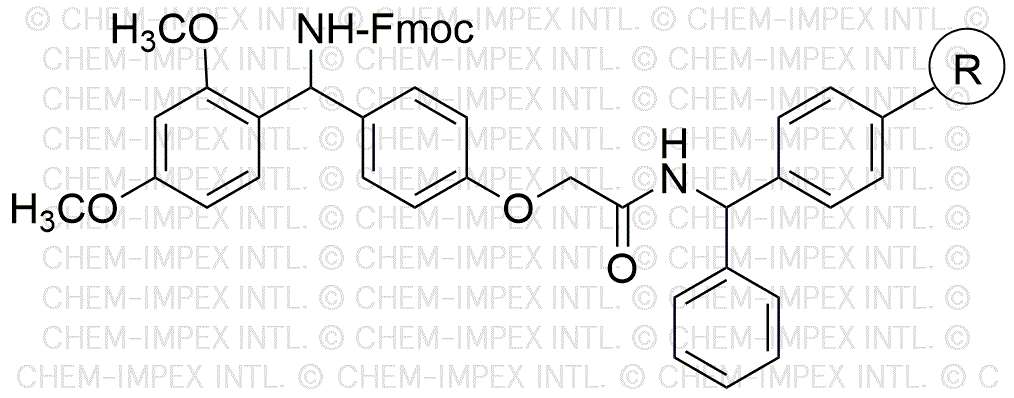4-(2', 4'-Dimethoxyphenyl-Fmoc-aminomethyl)-phenoxyacetamino-BHA resin is widely utilized in research focused on:
- Peptide Synthesis: This resin is commonly used in solid-phase peptide synthesis, allowing researchers to efficiently create complex peptides for various applications, including drug development and biological research.
- Drug Discovery: The resin facilitates the synthesis of peptide libraries, which are crucial for identifying potential drug candidates and understanding their interactions with biological targets.
- Bioconjugation: Its unique chemical structure enables effective conjugation with biomolecules, enhancing the development of targeted therapies and diagnostic agents in the pharmaceutical industry.
- Research in Cancer Therapeutics: The resin can be utilized to create peptide-based therapeutics that specifically target cancer cells, offering a promising avenue for developing more effective treatments.
- Customizable Functionalization: Researchers appreciate the ability to modify the resin for specific applications, providing flexibility in experimental design and improving the efficiency of synthesis processes.
Informations générales
Propriétés
Sécurité et réglementation
Applications
4-(2', 4'-Dimethoxyphenyl-Fmoc-aminomethyl)-phenoxyacetamino-BHA resin is widely utilized in research focused on:
- Peptide Synthesis: This resin is commonly used in solid-phase peptide synthesis, allowing researchers to efficiently create complex peptides for various applications, including drug development and biological research.
- Drug Discovery: The resin facilitates the synthesis of peptide libraries, which are crucial for identifying potential drug candidates and understanding their interactions with biological targets.
- Bioconjugation: Its unique chemical structure enables effective conjugation with biomolecules, enhancing the development of targeted therapies and diagnostic agents in the pharmaceutical industry.
- Research in Cancer Therapeutics: The resin can be utilized to create peptide-based therapeutics that specifically target cancer cells, offering a promising avenue for developing more effective treatments.
- Customizable Functionalization: Researchers appreciate the ability to modify the resin for specific applications, providing flexibility in experimental design and improving the efficiency of synthesis processes.
Documents
Fiches de données de sécurité (FDS)
La FDS fournit des informations de sécurité complètes sur la manipulation, le stockage et l’élimination du produit.
Spécifications du produit (PS)
Le PS fournit une description complète des propriétés du produit, notamment sa composition chimique, son état physique, sa pureté et les exigences de stockage. Il détaille également les plages de qualité acceptables et les applications prévues du produit.
Certificats d'analyse (COA)
Recherchez des certificats d'analyse (COA) en saisissant le numéro de lot du produit. Les numéros de lot et de lot se trouvent sur l'étiquette d'un produit, après les mots « Lot » ou « Lot de fabrication ».
Numéro de catalogue
Numéro de lot/série
Certificats d'origine (COO)
Ce certificat d'exploitation confirme le pays dans lequel le produit a été fabriqué, et détaille également les matériaux et composants utilisés et s'il est issu de sources naturelles, synthétiques ou autres sources spécifiques. Ce certificat peut être requis pour les douanes, le commerce et la conformité réglementaire.
Numéro de catalogue
Numéro de lot/série
Fiches de données de sécurité (FDS)
La FDS fournit des informations de sécurité complètes sur la manipulation, le stockage et l’élimination du produit.
DownloadSpécifications du produit (PS)
Le PS fournit une description complète des propriétés du produit, notamment sa composition chimique, son état physique, sa pureté et les exigences de stockage. Il détaille également les plages de qualité acceptables et les applications prévues du produit.
DownloadCertificats d'analyse (COA)
Recherchez des certificats d'analyse (COA) en saisissant le numéro de lot du produit. Les numéros de lot et de lot se trouvent sur l'étiquette d'un produit, après les mots « Lot » ou « Lot de fabrication ».
Numéro de catalogue
Numéro de lot/série
Certificats d'origine (COO)
Ce certificat d'exploitation confirme le pays dans lequel le produit a été fabriqué, et détaille également les matériaux et composants utilisés et s'il est issu de sources naturelles, synthétiques ou autres sources spécifiques. Ce certificat peut être requis pour les douanes, le commerce et la conformité réglementaire.

